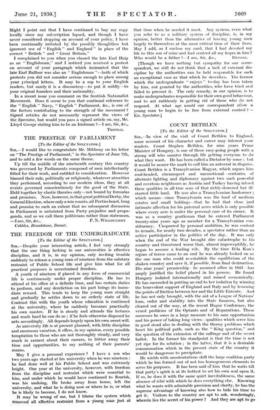THE FREEDOM OF THE UNDERGRADUATE [To the Editor of the
SPECTATOR.]
Sin,—Despite your interesting article, I feel very strongly that the one thing lacking in our universities is effective discipline, and it is, in my opinion, only inviting trouble suddenly to release a young man of nineteen from the salutary restraint of Public School life and give him what for all practical purposes is unrestrained freedom.
A youth of nineteen if placed in any form of commercial life is continuously under proper discipline. He has to attend at his ,office at a definite time, and has certain duties to perform, and any dereliction on his part brings its imme- diate reward. This tends to keep the young man straight and gradually he settles dOwn to an orderly state of life. Contrast this with the youth whose education is continued at the university, where he suddenly becomes practically his own master. If he is steady and attends the lectures and reads hard he can do so-; if he feels otherwise disposed he acts accordingly. All depends largely upon his own sweet will.
As university life is at present planned, with little discipline and enormous vacation, it offers, in my opinion, every possible temptation to those who are not thoroughly steady, and very much in earnest about their careers, to fritter away their time and opportunities, to say nothing of their parents' means.
May I give a personal experience ? I have a son who two years ago started at his university when he was nineteen : he had done well at his Public School and was extremely bright. One year at the university, however, with freedom from the discipline and restraint which were essential to him, and under which he would have continued to flourish, was his undoing, He broke away from home, left the university, and what he is doing now or where he is, or what he is likely to become, I do not know.
It may be wrong of me, but I blanie the system which removed all effective restraint from a -young man just at
that time when he needed it most. Any system, even what you refer to as a military system of discipline, is, in my opinion, better than the alternative of leaving young men largely to themselves at the most critical time of their lives. May I add, as I enclose my card, that I had devoted my life to this son of mine and had centred all my hopes in him ?
Who would be a father ?—I am, Sir, &c., DEVOI n
[Though we have nothing but sympathy for our corre- spondent, we still do not think that a lack of external dis- cipline by the authorities can be held responsible for such an exceptional case as that which he describes. The licence which the undergraduate " enjoys " to-day has been taken by him, not granted by the authorities, who have tried and failed to prevent it. The only remedy, in our opinion, is to make undergraduates responsible for their own good behaviour, and to act ruthlessly in getting rid of those who do not respond. At what age would our correspondent al:ow a young man to begin to be free from external control ?- En. Spectator.]








































 Previous page
Previous page